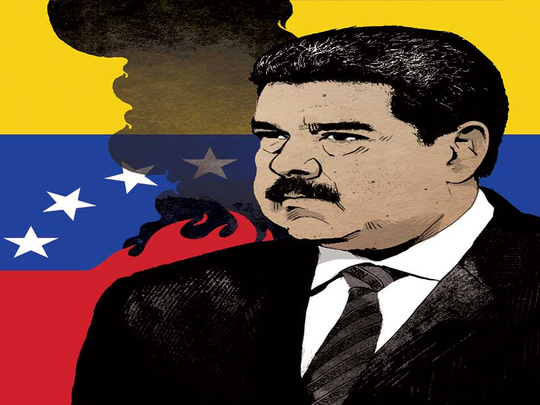
Very few outside Venezuela seem to have the courage to describe it as such, but the country under President Nicolas Maduro is now a dictatorship. The heir of Hugo Chavez has shown that he will happily violate all principles of democracy and human rights to remain in power. For years, Chavez proudly reminded the world how many elections he had won and how his revolution was giving a voice to the impoverished masses. Today, Maduro has no interest in anybody else’s voice — especially the growing majority that opposes him.
The presidential recall referendum, which could have led to early elections if it had been held this year, was killed off by regional courts that had no say in electoral matters. The elections for governors and mayors, which would have been a major defeat for the “Chavistas”, were arbitrarily postponed by the government-controlled Electoral Council. And the National Assembly, in which the opposition holds a two-thirds majority, continues to be obstructed by a Supreme Court also controlled by Maduro.
Opposition leaders continue to be imprisoned on trumped-up charges. And then there is the matter of the political prisoners. The most emblematic case is opposition leader Leopoldo Lopez, who was jailed for 13 years for “inciting violence” during the 2014 protests, in which police, military and government militias killed unarmed protesters. Months later, Lopez’s prosecutor, Franklin Nieves, fled the country and admitted that the trial had been a sham.
That, however, changed nothing. Why do people seem to find it so difficult to call things by their proper name when it comes to Venezuela? For years, many in the opposition cried wolf, denouncing the government as a dictatorship. It is hard to believe that they have been proved — eventually — right. Chavez won his first election in 1998 with 3.6 million votes. In 2006, he was re-elected with 7.3 million votes. To many in the opposition, it was unbelievable that so many people could support him. Rather than accept that there was a huge mass of Venezuelans who had been marginalised for decades, they accused the president of fraud and labelled him a dictator.
Chavez was an authoritarian; there is no doubt about that. That is why he, a former coup leader, was elected in the first place. In the late 1990s, the middle class (and even some of the rich) were longing for “a strongman with well-strapped boots” that could bring order to the country. So Chavez gladly took the reins, but he was generally careful about crossing the line between democracy and dictatorship. Even as he shut down the RCTV television network and 34 radio stations, he managed to do it under a guise of legality. His party ruled supreme in the National Assembly, yes, but only because the opposition had withdrawn from the elections. Now that Maduro has demolished what was left of Chavez’s democratic facade, many outside Venezuela are left wondering who to believe. But some things are undeniable.
Maduro and his allies are blocking elections. Opposition leaders continue to be imprisoned on trumped-up charges. And as much as his supporters would like to blame the shortages of food and medicines, the failure of the electric grid and other services, the madness of an inflation above 700% and the cannibalisation of Venezuela’s oil industry on an imaginary “economic war” waged by an evil empire, the truth is that all of this is a result of the policies of Maduro (and Chavez).
All peaceful and democratic paths seem closed now. A dialogue mediated by the Vatican has only managed to split the opposition in half: On one side are those who don’t believe that the government is capable of sincere dialogue and the talks are just a public relations stunt. On the other, those who know that most dialogues in the history of conflict resolution happened under similar circumstances. More importantly, they understand that no amount of street protests — or even a popular revolt — will pressure Maduro into resigning. Some of them are so pessimistic that they are now looking to the presidential elections of 2018 as a way out. Do they honestly think that by then the government will be willing to respect democracy?
Meanwhile, there is very little that the international community can do to help. But it would be refreshing to see the British ask questions to those that are doing business with a dictatorship. Why has BP been selling oil to Venezuela? Why is British public relations firm Bell Pottinger, according to Bloomberg, whitewashing the reputation of Venezuelan state oil company PDVSA? Why is Unite, the largest trade union in Britain, hosting PR events in London in support of Maduro? Do they all know they are taking money from a dictatorship? Do they care? And what about Jeremy Corbyn, the Labour Party leader, and all those politicians who have spoken out and signed letters in support of Maduro? We would love to hear what they have to say about all this.
— Guardian News & Media Ltd
Reynaldo Trombetta is a Venezuelan journalist. Before moving to England in 2008, he reported on politics, repression and protests in Venezuela.












